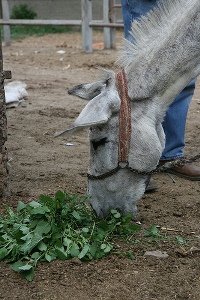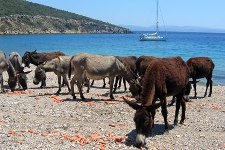What Do Donkeys Eat?
 Like all
animals, donkeys are considered to be heterotrophic.
More specifically, they are herbivores
because they only eat autotrophs including
wheat bran, crushed
barley, linseed,
sheaf oats, clover,
alfalfa hay, and
small quantities of
corn.
Treats for
these animals include raw veggies, bread,
and stale cake. The
liquids these animals consume
include milk from
the female, jennet, and water.
Interestingly,
donkeys will never drink stale water
and must be within a two to three day reach
of a water source. The overall diet of
donkeys consists of low protein foods because
food high in protein can cause them to
develop
skin rashes.
Like all
animals, donkeys are considered to be heterotrophic.
More specifically, they are herbivores
because they only eat autotrophs including
wheat bran, crushed
barley, linseed,
sheaf oats, clover,
alfalfa hay, and
small quantities of
corn.
Treats for
these animals include raw veggies, bread,
and stale cake. The
liquids these animals consume
include milk from
the female, jennet, and water.
Interestingly,
donkeys will never drink stale water
and must be within a two to three day reach
of a water source. The overall diet of
donkeys consists of low protein foods because
food high in protein can cause them to
develop
skin rashes.
Over the course of evolution, donkeys are considered to be grazers, meaning that they snack continuously throughout the day. Donkeys require an abundance of food intake because plants are composed of many indigestible components. In fact, the digestive efficiency of herbivores ranges from only 35-50% whereas carnivore digestive efficiency is 80-95%.
 Donkey have a well
developed digestive tract, yet unlike
cows,
sheep and
goats, donkeys do not possess ruminants.
Non-ruminant animals do not possess a rumen,
reticulum, omasum, or abomasum.
Instead, once their food is ingested it will
eventually go through a functional caecum.
The functional caecum is at the posterior
end of the digestive system and is
responsible for additional break down of
nutrients through
bacterial fermentation.
Donkey have a well
developed digestive tract, yet unlike
cows,
sheep and
goats, donkeys do not possess ruminants.
Non-ruminant animals do not possess a rumen,
reticulum, omasum, or abomasum.
Instead, once their food is ingested it will
eventually go through a functional caecum.
The functional caecum is at the posterior
end of the digestive system and is
responsible for additional break down of
nutrients through
bacterial fermentation.
The picture on the left is a donkey eating for the first time in two weeks and the donkeys on the right are treating themselves to carrots.
You've almost mastered the donkey. You just need some background information on their history.
Copyright © 2007, Design by: Sunlight webdesign